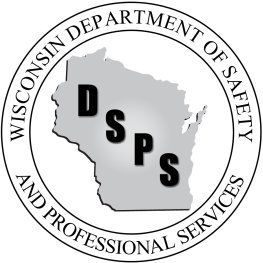DSPS Budget Lowers Licensing Fees, Invests in Veterans, Fire Prevention, Clean Water, and Efforts to Curb Opioid Epidemic
MADISON, Wis. – Department of Safety and Professional Services Secretary-designee Dawn Crim has proposed a budget that again reduces credentialing fees and also invests in resources that deliver greater value to customers—all while maintaining and promoting safety.
For the next biennium, DSPS seeks to promote careers in the fire service, expand utilization of the Enhanced Prescription Drug Monitoring Program, expedite transition into licensed professions within the civilian workforce for military veterans, and maintain a clean-water grant program for owners of private, onsite wastewater treatment systems. The department is also proposing several initiatives to improve agency efficiency and modernize operations, all while cutting licensing fees for many credential holders.
Proposed efforts include the following:
- Grow the Ranks of Fire Departments
Among new programs is a grant program to promote fire-fighter training partnerships between fire departments, technical colleges, and high schools. Modeled after initiatives in several Wisconsin communities, including Sun Prairie, the grant program would enable students to begin their fire fighter training while still in high school, with participation counting toward credit required for both high school graduation and fire fighter preparation programs. The result would be another a workforce pipeline for fire departments that struggle to recruit and retain staff and a path to graduation for high-school students who may not be college bound. - Promote Responsible Opioid Prescribing
The department also looks to launch a grant program to enable health care providers who face financial barriers to integrating the Enhanced Prescription Drug Monitoring Program into their practice. The ePDMP is an award-winning online database that houses prescribing information for opioids, benzodiazepines, and stimulants. The data allows providers to make more informed prescribing decisions for individual patients, and its aggregated data can inform county and state public health responses to the opioid epidemic. Some providers use electronic health record-keeping systems that require additional software investments in order to integrate the ePDMP into their user interfaces, and the cost can be initially prohibitive. This grant program would make it more affordable to invest in necessary upgrades so that ePDMP use is seamless. This would increase utilization rates. - Support Military Veterans Entering the Civilian Workforce
Individuals serving in the armed forces receive extensive training that enables them to perform a wide range of duties and functions, including work that has broad application outside the military. Many have knowledge and skills that would transfer directly to work in many fields, but their military training is not usually recognized by institutions that provide the education required for licensure. Through this effort, the department would work with the Wisconsin National Guard and certificate or degree-granting institutions to establish frameworks for recognizing and granting credit for military training. This would enable veterans to more quickly and easily obtain licenses and begin civilian careers. - Sustain Clean Drinking Water Grant Program
The department seeks to renew the Wisconsin Fund. Since its inception in 1978, the Wisconsin Fund has awarded more than $108 million in grants to assist more than 43,000 residences and businesses repair or replace aging private, onsite waste-water treatment systems, which treat household wastewater when municipal sewer service is unavailable. Household wastewaters may contain substances such as disease-causing bacteria and viruses, household chemicals, and excess nutrients that can contaminate groundwater. Helping home and small business owners maintain their private water treatment systems ensures cleaner drinking water for all of Wisconsin. The Wisconsin Fund is currently slated to sunset in June 2021. - Create a Contractor Registration Program
The department will partner with the Department of Workforce Development to create a registration for contractors so that the state can more easily identify issues of worker misclassification. Worker misclassification is the practice of treating a worker as an independent contractor when the worker actually meets the legal definition of an employee. This misclassification enables contractors to avoid employee-related costs, such as the payment of unemployment insurance. It also denies workers benefits that should be afforded them as employees, such as employer-sponsored health insurance and paid leave. This registration program will help workers access the benefits they deserve, will help protect them in periods of unemployment, and will ensure that costs that should be borne by employers are not passed along to taxpayers.
All of these programs are included in the departments 2021-2023 biennial budget proposal. Other spending requests include several initiatives related to updating dated technology, including transitioning more customer-facing services to a single platform. The department also seeks authority to take steps to transition more agency operations and communications to electronic-only formats, thereby expediting interactions with customers and limiting paper use and consumption.
“Technology modernization is critical for successful agency operations,” Secretary-designee Crim said. “Updated technology enables employees to work more efficiently, which saves time and money, and it enables us to transition to more paperless operations, which is not only more sustainable but also makes information more easily accessible to employees who work from five different offices across the state. It is also better for customers, who increasingly expect to be able to conduct business—including submitting materials, making payments, and checking status—electronically and using mobile devices.”
This is the second time Secretary-designee has implemented significant fee cuts for hundreds of thousands of Wisconsin license holders. The previous fee study, released in 2019, also reduced fees across most licensed professions and equalized each license initial and renewal fees across the board.
“I am mindful of the impact the pandemic has had on our state and our licensees,” Secretary-designee Crim said. “I am pleased that we are able to make these adjustments to keep a few more dollars in the pockets of thousands of credential holders across multiple occupations. That is always important to do, but especially so now.”
Statute requires DSPS to evaluate its fee schedule every two years. Secretary-designee submitted the study to the Joint Committee on Finance earlier this month. The adjusted fees will be in effect for fiscal years 2021-2023.
“The people of Wisconsin deserve leaders who are looking out for them and who make decisions in their best interest,” said Governor Tony Evers. “That is exactly who Secretary Crim is. When times are tough, like they are right now, Secretary Crim is someone you want on your side fighting for what you need.”
The department is a fee-based agency and receives no resources from taxpayer funds for normal operations. However, DSPS is subject to legislative oversight regarding spending, and funds in excess of its approved budget cannot be used to add staff or make system improvements without express approval.
“We are sensitive to our customers’ needs,” said Secretary-designee Crim. “We are mindful of both the cost and quality of our services, and we seek to make adjustments both to what we charge and also the resources we have at our disposal to do the best work we can for the people of Wisconsin.”
Among is broad and varied responsibilities, the Department of Safety and Professional Services issues more than 240 unique licenses, administers dozens of boards and councils that regulate professions, and enforces state building codes. A fee-based agency, the Department of Safety and Professional Services operates entirely on program revenue and receives no general fund tax dollars for its day-to-day operations. With five offices and 250 employees throughout Wisconsin, DSPS collaborates with constituents and stakeholders across a wide range of industries to promote safety and economic prosperity.
NOTE: This press release was submitted to Urban Milwaukee and was not written by an Urban Milwaukee writer. While it is believed to be reliable, Urban Milwaukee does not guarantee its accuracy or completeness.
Mentioned in This Press Release
Recent Press Releases by Wisconsin Department of Safety and Professional Services
Governor Evers’ Budget Promotes Safety, Strong Workforce
Apr 3rd, 2025 by Wisconsin Department of Safety and Professional ServicesFunding helps DSPS remain a leader in safe and efficient regulation





















